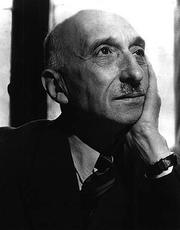The French author François Mauriac (1885-1970), a fervent Catholic, is best known for his novels, usually set in Bordeaux or the Landes district of southwestern France, with their central themes of faith, sin, and divine grace.
François Mauriac was born in Bordeaux on Nov. 11, 1885, of a prosperous middle-class family. He lost his father in infancy, but the influence of his mother, a stern and puritanical Catholic, pervades his literary works. Educated at a Catholic school and at Bordeaux University, Mauriac moved to Paris in 1906, determined to become a writer. He published his first volume of poems in 1909; more poetry and two novels followed before he was mobilized as an army medical orderly in 1914. He was invalided out 3 years later. From 1920 date Mauriac's most productive years as a novelist, his novels including Le Baiser au lépreux (1922; A Kiss for the Leper), Genitrix (1923; Genitrix), Le Désert de l'amour (1925; The Desert of Love), and Thérèse Desqueyroux (1927; Thérèse ).
About 1928 came a religious crisis in Mauriac's life, with a corresponding change of emphasis in his works. Earlier he had been criticized for portraying sinners more attractively than believers in the narrow, provincial, middle-class families of his novels, where, as all sexuality implies sin, love and happiness become impossible. Now he began to stress the possibility of divine grace, even for the hardened atheist and family tyrant who is the hero of Le Noeud de vipères (1932; Vipers' Tangle), the most successful of the later novels. In 1933 Mauriac was elected to the French Academy. Other works of this period include biographies, more poetry, and religious essays.
In the late 1930s Mauriac found politics coming to the forefront of his attention: he denounced Gen. Franco's insurrection in Spain and later, after the German defeat of France in 1940, helped the cause of the French Resistance with his pen. After the Liberation he continued to write hard-hitting political articles in several newspapers. More novels, stage plays, volumes of criticism, memoirs, and diaries brought Mauriac's total number of books to over 60. Awarded the Nobel Prize for literature in 1952, Mauriac became, after De Gaulle's return to power in 1958, one of the President's most passionate supporters. Mauriac died on Sept. 1, 1970.
Mauriac's fictional world is that of his childhood and adolescence in the Landes region in the period about 1900, which he evokes with poetic intensity; his primary theme, the clash between sin and the desire for religious salvation. "I try to make the Catholic universe of evil palpable, tangible, odorous." This powerful creation of atmosphere and shrewd psychological insight--if perhaps in a somewhat narrow field--have brought Mauriac an extremely high reputation as a novelist.
Source: Encyclopedia of World Biography
607 works Add another?

Most Editions
Most Editions
First Published
Most Recent
Top Rated
Reading Log
Random
Showing all works by author. Would you like to see only ebooks?
Subjects
French fiction, Fiction, French Authors, Catholic Church, Biography, French literature, History and criticism, Translations into English, Authors, French, Fiction, general, Christian life, Diaries, History, Criticism and interpretation, French language, Catholic authors, Continental european fiction (fictional works by one author), Correspondence, Influence, Religion, Women, Apologetic works, Apologetics, Christianity, Lord's SupperPeople
François Mauriac (1885-1970), Jesus Christ, Blaise Pascal (1623-1662), Marcel Proust (1871-1922), Jean Racine (1639-1699), André Lafon (1883-1915), Charles de Gaulle (1890-1970), Margherita da Cortona, Saint (1247-1297), Henri-Dominique Lacordaire (1802-1861), Jacqueline Pascal (1625-1661), Jacques Rivière (1886-1925), Maurice Barrès (1862-1923), Brieux (1858-1932), Charles de Gaulle pres, France (1890-), E. Jaloux, Eugène Brieux (1858-1932), Franc̦ois Mauriac (1885-1970), Fran©ʹois Mauriac (1885-1970), François Mauriac, Georges Duhamel (1884-1966), Gustave Flaubert (1821-1880), Jacques Bénigne Bossuet (1627-1704), Jacques-Emile Blanche (1861-1942), Jean Paulhan (1884-1968), Jean-Jacques Rousseau (1712-1778)Time
20th century, 17th century, 19th century, German occupation, 1940-1945, 1945-, 1950's, Revolution, 1954-1962, s. XXID Numbers
- OLID: OL4280625A
- ISNI: 0000000121201088
- VIAF: 9850407
- Wikidata: Q81685
- Inventaire.io: wd:Q81685
Links outside Open Library
No links yet. Add one?
Alternative names
- François Mauriac
- Francois Mauriac
- François Mauriac
- Franc ʹois Mauriac
- F. Mauriac
- Mauriac
- François MAURIAC
- Franco̧is Mauriac
- Franc ·ois Mauriac
- Francois MAURIAC
- Franc̦ois Mauriac
- Francois, Mauriac
- Fran^cois Mauriac
- Franc?ois Mauriac
- Francoise Mauriac
- Franois Mauriac
- Mauriac, François
- Mauriac, Fran Ois
| September 30, 2020 | Edited by MARC Bot | add ISNI |
| April 19, 2017 | Edited by MARC Bot | add VIAF and wikidata ID |
| August 23, 2011 | Edited by Ludovicus | Added photo, bio, dates |
| August 23, 2011 | Edited by Ludovicus | Added new photo |
| August 27, 2008 | Created by ImportBot | Imported from Western Washington University MARC record |


